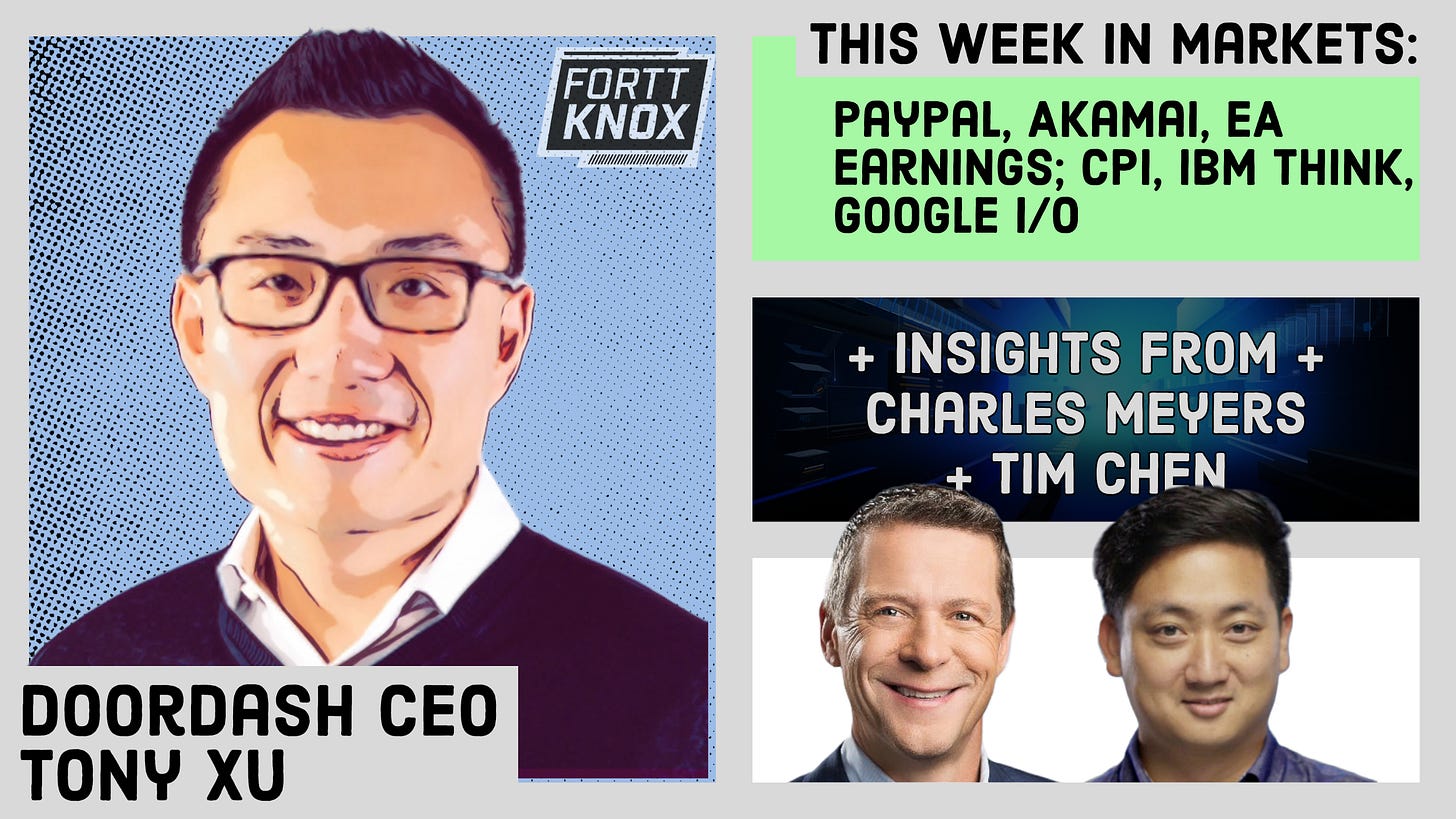Earnings Delivered Mixed View of Economy; Next Up: AI Battles
Tony Xu of DoorDash, Charles Meyers of Equinix, Tim Chen of NerdWallet
Top of Mind
THE ECONOMY ADDED 253K JOBS in April, far ahead of the 180K expected. What does that mean for the economy and the market? On the positive side, it means the Federal Reserve's campaign of interest rate hikes hasn't driven the economy off a cliff, and the aftershocks of the March collapse of Silicon Valley Bank didn't upend Main Street. On the negative side, it means the Fed can't be confident that the economy is slowing enough to tame inflation, so it might be too soon to take more interest rate hikes off the table entirely. Stocks rallied Friday after the report, which included revisions showing job growth in previous months was more muted. They could just as easily swing the other way this week as traders digest the possibility of persistent inflation and a game of debt-ceiling chicken in Congress.
COMPANIES HAVE BEEN TOUTING ARTIFICIAL INTELLIGENCE as a growth driver, but we got the first whiff of its power to kneecap growth. Educational technology company Chegg reported earnings last week and projected a sales slowdown from potential customers turning to ChatGPT instead; the stock dropped about 50% after hours. That opens the door to question what other companies might have AI vulnerabilities, even as they tout their AI ambitions. Along those lines, two companies have conferences this week where they'll be trying to project strength in AI, and I'll be on the lookout for weaknesses: Google and IBM.
On the Radar
CPI: Wednesday's report of April's Consumer Price Index will shed light on whether the economy is cooling enough that the Fed can pause interest rate hikes. The consensus calls for the reading to be up 5%, the same as a month ago. Core CPI, excluding food and energy, is expected to be up 5.5%.
DIS: Disney reports earnings after the bell on Wednesday, after a rocky series of media company readouts. Four things I'll be tracking: 1. the trajectory of streaming costs vs. subscriber growth; 2. the steadiness of the Marvel movie franchise after a so-so Guardians open and Kang the Conqueror issues; 3. the emergence of theme parks as a bright spot as travel remains elevated; 4. the impact of the writers strike on TV.
IBM: At IBM's annual Think event Tuesday through Thursday, attendees will be listening for IBM's argument for why it's a victor and not a victim in the accelerating artificial intelligence era. IBM was an early funder of the AI marketing hype 25 years ago with chess-playing Deep Blue and a decade ago with Jeopardy-playing Watson but never achieved category-defining business traction. Now, under CEO Arvind Krishna, can the company redeem the earlier efforts and gain advantage? Or will AI automate tasks that once required consultants, turning IBM's massive workforce into a margin drain?
GOOGL: Similarly, Google has a thing or two to prove at its annual Google I/O developer event, which kicks off Wednesday in Mountain View. Google has long touted its AI prowess in Pixel phone features and efficient web services. Today's challenge from Microsoft and Open AI raises the question of whether the software giant can successfully sell its cloud offerings as the best platform for AI developers' generative and inferencing workloads. We'll see what Google Cloud CEO Thomas Kurian has to say.
Reporter's Notebook
Last week's earnings reports and economic data painted a picture of an economy under stress but not collapsing. I spoke with a half-dozen CEOs in Fortt Knox Earnings conversations (below) after their reports, and heard details on back-office software, multicloud, datacenters, travel, consumer lending and restaurant delivery. But two of the most important conversations, for context, weren't on Fortt Knox this week. One I capture in my Working Lunch segment, and the other we had live on the 4 p.m. ET hour on CNBC.
The first, linked below, is a piece based on two of the conversations I've had with Microsoft CEO Satya Nadella: one six years ago, the other three months ago. They shed light on how he's trying to position Microsoft as a share gainer in the AI era.
The second is a conversation with arguably the first public-company CEO to say his company's sales have been pinched by the emergence of generative AI services. Can he recover? And what are the red flags for other businesses? That video linked below as well.
VIDEO
Microsoft CEO Satya Nadella on How Cloud Paved the Way for AI: CNBC Working Lunch
Chegg CEO Dan Rosensweig on How AI Sapped Demand in March
After the study software company's stock tanked, the CEO joined us on Overtime.
Girish Mathrubootham, Freshworks CEO: Fortt Knox Earnings
Customer service efficiency drives a strong quarter as the services economy chugs along.
Tim Chen, NerdWallet CEO: Fortt Knox Earnings
As banks grapple with rate hikes and market turmoil, restricted credit hits NerdWallet guidance.
Amit Walia, Informatica CEO: Fortt Knox Earnings
Multicloud continues to be an important theme as cloud customers push for cost savings.
Tony Xu, DoorDash CEO: Fortt Knox Earnings
Demand for delivery and faster growth in convenience and grocery drive a beat-and-raise quarter.
David Roberts, Verra Mobility CEO: Fortt Knox Earnings
Strength in travel helped the company beat earnings expectations.
Charles Meyers, Equinix CEO: Fortt Knox Earnings
Data sovereignty rules are driving demand for Equinix's geographically distributed data centers.


